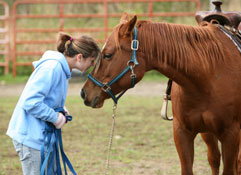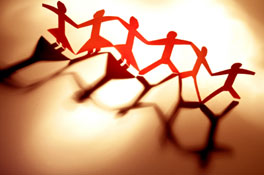Synopsis
 is a documentary film that explores how non-invasive therapies, which target the senses, such as photography, dance, and horseback riding are empowering, revitalizing, and transforming children and adults with Fetal Alcohol Syndrome.
is a documentary film that explores how non-invasive therapies, which target the senses, such as photography, dance, and horseback riding are empowering, revitalizing, and transforming children and adults with Fetal Alcohol Syndrome.
 |
 |
 |
We learn how the introduction of various forms of sensory expression can facilitate communication, provide structure, and build confidence in the lives of people struggling to succeed against the overwhelming circumstances thrust on them by this condition.
Providing context for the stories,  also integrates insights and opinions from some of the foremost experts in various fields of non-invasive therapy, medicine, and clinical psychology. Among these people will be those who champion these therapies as a viable course of treatment and others who challenge it. This footage will also serve to substantiate the severity of the condition and the lack of consensus on treatment, while also drawing a comparison between the epidemic proportions of FAS in our society, and the relatively small amount of professional resources available to deal with it.
also integrates insights and opinions from some of the foremost experts in various fields of non-invasive therapy, medicine, and clinical psychology. Among these people will be those who champion these therapies as a viable course of treatment and others who challenge it. This footage will also serve to substantiate the severity of the condition and the lack of consensus on treatment, while also drawing a comparison between the epidemic proportions of FAS in our society, and the relatively small amount of professional resources available to deal with it.
 It is estimated that approximately 12,000 babies are born every year with Fetal Alcohol Syndrome (FAS). This is more than the number born with Muscular Dystrophy, HIV, Spina Bifida and Down Syndrome combined, making FAS the leading cause of mental impairment in the world.
It is estimated that approximately 12,000 babies are born every year with Fetal Alcohol Syndrome (FAS). This is more than the number born with Muscular Dystrophy, HIV, Spina Bifida and Down Syndrome combined, making FAS the leading cause of mental impairment in the world.
Because of this damage, FAS victims lack control over their thoughts, feelings, expressions, impulses and motor skills. One teenage victim described it as “…living like an animal all penned up in a big cage with a chain around its neck." It’s an apt description for the sense of confinement FAS sufferers feel in being able to see and comprehend the “normal” world around them but never being able to enter into it. Instead, they see the lives of everyone around them moving ahead while theirs are mired in incidences of confusion, embarrassment, shame and frustration. It’s as though they’ve received a life sentence for a crime they didn’t commit.
 Unable to find the special attention and understanding they require, many of these children withdraw from society. Despite their best efforts, school systems, government welfare agencies, the medical community and caregivers do not fully address their problems. Not surprisingly, many kids with FAS fall into lives of juvenile delinquency, poverty, unemployment, crime and addiction. A recent study of the prison population in the United States revealed that at least sixty percent of our country’s inmates suffer from some degree of FAS.
Unable to find the special attention and understanding they require, many of these children withdraw from society. Despite their best efforts, school systems, government welfare agencies, the medical community and caregivers do not fully address their problems. Not surprisingly, many kids with FAS fall into lives of juvenile delinquency, poverty, unemployment, crime and addiction. A recent study of the prison population in the United States revealed that at least sixty percent of our country’s inmates suffer from some degree of FAS.
 But not every FAS victim slips through the cracks. In fact, some are experiencing significant improvement in the quality of their lives through the introduction of various non-invasive therapies. While not a cure for FAS, these therapies seem to work around some of the major symptoms by allowing FAS sufferers to explore and create without the fear of making mistakes. In therapy there are no wrong answers. But there is an emotional safety that comes with freedom from scrutiny and outside criticism—an unconditional acceptance. The satisfaction attained by some individuals with FAS during therapy appears similar to the endorphin release one might feel during exercise. They feel revitalized. As a result, non-invasive therapies can provide FAS victims a strong self-image and pride in their abilities—allowing them to live more comfortably within the confines of their condition.
But not every FAS victim slips through the cracks. In fact, some are experiencing significant improvement in the quality of their lives through the introduction of various non-invasive therapies. While not a cure for FAS, these therapies seem to work around some of the major symptoms by allowing FAS sufferers to explore and create without the fear of making mistakes. In therapy there are no wrong answers. But there is an emotional safety that comes with freedom from scrutiny and outside criticism—an unconditional acceptance. The satisfaction attained by some individuals with FAS during therapy appears similar to the endorphin release one might feel during exercise. They feel revitalized. As a result, non-invasive therapies can provide FAS victims a strong self-image and pride in their abilities—allowing them to live more comfortably within the confines of their condition.
The stories contained within this film are gripping and at times hard to watch, but always inspiring. Through these stories we’ll experience the debilitating effects of FAS, the daily struggle toward a sense of normalcy and the transformative effects of various types of therapy. And in witnessing this transformation, we’ll come to understand how various non-invasive therapies can unlock the potential of people who have felt very little acceptance, seldom known accomplishment and rarely had a voice.